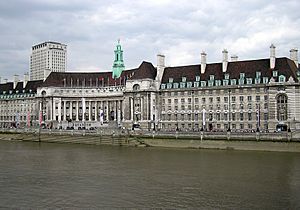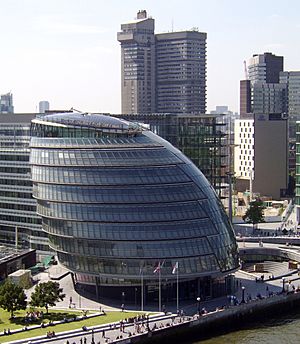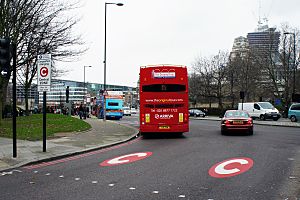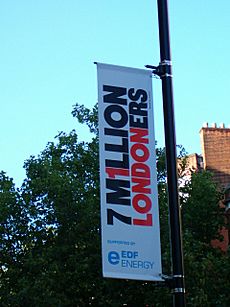Ken Livingstone facts for kids
Quick facts for kids
Ken Livingstone
|
|
|---|---|
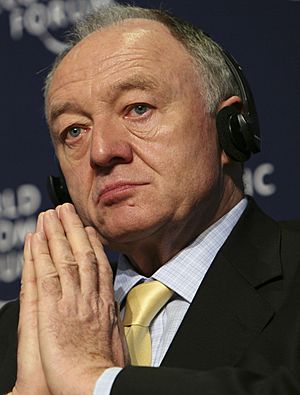
Livingstone at the World Economic Forum in 2008
|
|
| Mayor of London | |
| In office 4 May 2000 – 3 May 2008 |
|
| Deputy | Nicky Gavron Jenny Jones Nicky Gavron |
| Preceded by | Office established |
| Succeeded by | Boris Johnson |
| Leader of the Greater London Council | |
| In office 17 May 1981 – 31 March 1986 |
|
| Deputy | Illtyd Harrington John McDonnell Michael Ward |
| Preceded by | Horace Cutler |
| Succeeded by | Office abolished |
| Member of Parliament for Brent East |
|
| In office 11 June 1987 – 14 May 2001 |
|
| Preceded by | Reg Freeson |
| Succeeded by | Paul Daisley |
| Councillor for the Lambeth London Borough Council | |
| In office 13 May 1971 – 4 May 1978 |
|
| Ward | Knight's Hill |
| Councillor for the Greater London Council | |
| In office 12 April 1973 – 31 March 1986 |
|
| Divisions | Norwood (1973–1977) Hackney North and Stoke Newington (1977–1981) Paddington (1981–1986) |
| Succeeded by | Position abolished |
| Personal details | |
| Born |
Kenneth Robert Livingstone
17 June 1945 Lambeth, London, England |
| Political party | Independent (2018–present; 2000–2003) |
| Other political affiliations |
Labour (1968–2000; 2003–2018) |
| Spouses |
Christine Chapman
(m. 1973; div. 1982)Emma Beal
(m. 2009) |
| Children | 5 |
| Education | Philippa Fawcett Teacher Training College |
Kenneth Robert Livingstone (born 17 June 1945) is a former English politician. He was the first Mayor of London, serving from 2000 to 2008. Before that, he was the Leader of the Greater London Council (GLC) from 1981 until it was shut down in 1986. He was also a Member of Parliament (MP) for Brent East from 1987 to 2001.
Livingstone was a member of the Labour Party for most of his career. He is a socialist, which means he believes that important services and industries should be run for the good of the public, not just for profit.
Born in South London to a working-class family, Livingstone became interested in politics at a young age. He was known for his strong left-wing views, which earned him the nickname "Red Ken" in the newspapers. He supported causes like LGBT rights and a United Ireland.
As Mayor of London, he introduced the London congestion charge to reduce traffic and the Oyster card for public transport. He also helped London win the bid to host the 2012 Summer Olympics. His leadership after the 7 July 2005 London bombings was widely praised.
Livingstone has always been a controversial figure. His supporters admired him for fighting for the rights of minorities and improving London. His critics disagreed with his views and connections to certain groups. In 2018, he resigned from the Labour Party after making controversial comments.
Contents
Early Life and Career
Childhood and First Jobs
Kenneth Robert Livingstone was born in Lambeth, South London, on 17 June 1945. His mother, Ethel, was a dancer, and his father, Robert, was in the Merchant Navy. His family was working-class and supported the Conservative Party.
Livingstone went to Tulse Hill Comprehensive School. He was interested in amphibians and reptiles and kept several as pets. He left school and worked as a technician at a cancer research lab from 1962 to 1970. There, he became involved in a trade union and his left-wing political views grew stronger.
Entering Politics
Livingstone joined the Labour Party in 1968. He became very active in his local branch in Norwood. In 1971, he was elected as a councillor for the Lambeth London Borough Council. He focused on improving housing for local people.
In 1973, he was elected to the Greater London Council (GLC), which was the top-level local government for London at the time. He continued to push for socialist policies.
Leader of the Greater London Council
In 1981, the Labour Party won control of the GLC. In a surprise move, Livingstone was elected as the new leader of the council, defeating the party's more moderate choice. The press nicknamed him "Red Ken" because of his socialist beliefs. Prime Minister Margaret Thatcher and her Conservative government were strong opponents of his policies.
Fares Fair Policy
One of Livingstone's most famous policies was called "Fares Fair." The plan was to lower the price of tickets on the London Underground and buses to encourage more people to use public transport. The GLC cut fares by 32% in October 1981.
However, the policy was challenged in court by the London Borough of Bromley. The courts ruled that the policy was illegal. The GLC had to raise the fares again. This was a major defeat for Livingstone, but it made him very popular with many Londoners.
Social Policies and Controversies
Livingstone's GLC supported many minority groups. It gave money to groups supporting women, LGBT people, and ethnic minorities. This was very controversial at the time and led to criticism from newspapers, who called the GLC the "loony left".
Livingstone was also a strong supporter of a United Ireland and was willing to meet with members of Sinn Féin, an Irish republican party. This caused a lot of anger, especially after bombings in London. He also opposed the monarchy and the Falklands War.
Abolition of the GLC
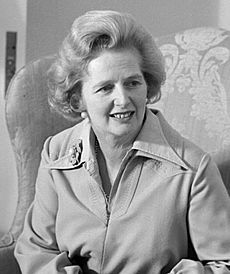
Prime Minister Margaret Thatcher's government disliked the GLC's high spending and socialist policies. In 1983, her government announced its plan to abolish, or get rid of, the GLC.
Livingstone led a large campaign to save the council, but it was not successful. The Local Government Act 1985 was passed, and the GLC was officially shut down on 31 March 1986.
Member of Parliament
After the GLC was abolished, Livingstone was elected as the Member of Parliament (MP) for Brent East in 1987. In Parliament, he was known as a left-wing rebel who often disagreed with his own party's leaders, especially Tony Blair and his "New Labour" project.
He continued to campaign against racism and opposed the Gulf War. He also became a well-known media figure, appearing on TV shows and writing for newspapers. He stood down as an MP in 2001 to run for Mayor of London.
Mayor of London
In 2000, the new position of Mayor of London was created. The Labour Party did not choose Livingstone as its candidate, so he decided to run as an independent. He was very popular with voters and won the election easily. He famously began his victory speech with the words, "As I was saying before I was so rudely interrupted 14 years ago..."
Livingstone was re-admitted to the Labour Party and was re-elected as mayor in 2004.
First Term (2000–2004)
As mayor, Livingstone had new powers over transport, policing, and economic development in London.
Transport Changes
- Congestion Charge: In 2003, he introduced the London congestion charge. Drivers had to pay a fee to enter central London. This was done to reduce traffic and pollution. The plan was controversial but successful in cutting down the number of cars.
- Oyster Card: The Oyster card, a smart card for paying for public transport, was also introduced in 2003.
- Buses: He replaced the old Routemaster buses with modern, accessible buses, including "bendy buses."
Other Policies
Livingstone also focused on social and environmental issues. He started festivals to celebrate London's diversity, such as the Rise: London United anti-racism festival and a Saint Patrick's Day event. He also helped London create a plan to host the 2012 Summer Olympics.
Second Term (2004–2008)
7/7 London Bombings
On 6 July 2005, London won its bid to host the 2012 Olympics. The very next day, London was attacked by terrorists. Bombs on three Underground trains and a bus killed 52 people.
Livingstone was in Singapore for the Olympic announcement. He immediately returned to London and gave a powerful speech, saying the attackers would not succeed in dividing the city. His leadership during this crisis was praised by many.
Controversies and Defeat
During his second term, Livingstone continued to be a controversial figure. He was criticised for meeting with a radical Muslim cleric and for making comments that were seen as offensive. In one incident, he was suspended from office for a month after comparing a Jewish journalist to a concentration camp guard, though this suspension was later overturned in court.
In the 2008 London mayoral election, he ran for a third term but was defeated by the Conservative candidate, Boris Johnson.
Later Career and Retirement
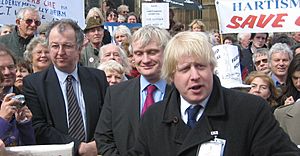
Livingstone tried to win back the mayoralty in the 2012 London mayoral election but lost to Boris Johnson again. After this defeat, he announced his retirement from frontline politics.
He remained a public figure and a strong supporter of the left-wing Labour leader Jeremy Corbyn.
Suspension and Resignation from Labour
In April 2016, Livingstone was suspended from the Labour Party. He made comments about Adolf Hitler and Zionism during a radio interview that caused widespread offence. He said that Hitler had supported Zionism "before he went mad and ended up killing six million Jews."
Many people, including other Labour politicians, called for him to be expelled from the party. An investigation found that he had brought the party into disrepute. After his suspension was extended, Livingstone resigned from the Labour Party in May 2018.
In September 2023, his family announced that he had retired from public life after being diagnosed with Alzheimer's disease.
Personal Life
Livingstone is known for his love of gardening and keeping amphibians, especially newts. He has five children. He married Emma Beal in 2009.
Throughout his career, he was known for his unique personality and sense of humour. Supporters saw him as a man of the people, while critics saw him as a divisive figure.
Images for kids
See also
 In Spanish: Ken Livingstone para niños
In Spanish: Ken Livingstone para niños
 | William Lucy |
 | Charles Hayes |
 | Cleveland Robinson |


